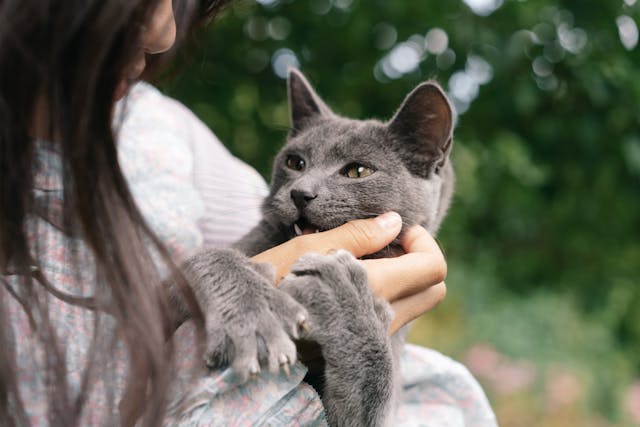
Why Your Cat Bites You During Playtime
Cats can be curious, cuddly, and downright comical—but sometimes, right in the middle of a playful moment, your sweet kitty turns into a mini land shark and bites you. If you’ve ever wondered, “Why does my cat bite me when we’re just having fun?”—you’re not alone.
While cat bites during play can be confusing or even painful, this behavior is actually a natural part of feline communication. The good news? You can teach your cat healthier play habits.
Let’s explore why cats bite during playtime—and more importantly, how to stop it.
Why Do Cats Bite During Play?
1. It’s Natural Hunting Behavior
Cats are predators by instinct—even the fluffiest housecat still carries the DNA of a wild hunter. Playtime mimics stalking, chasing, and pouncing. Biting is just the next step in their imaginary “hunt.”
2. Overstimulation
Cats have a threshold for touch. What starts as gentle play can quickly become too much, especially if you’re petting sensitive spots (like the belly or base of the tail). Biting is their way of saying, “I’m done.”
3. Lack of Proper Toys
If your hands or feet are their main “toys,” your cat may think biting them is part of the game. Without proper play tools, your kitty doesn’t learn the difference between your fingers and a mouse toy.
4. Kitten Energy or Teething
Young cats, especially kittens, often bite more during play as they learn boundaries and explore their environment. Teething can also make biting feel satisfying.
???? How to Stop the Biting
The key to curbing biting behavior is to redirect and respond consistently. Here’s how:
✅ 1. Use Toys—Not Hands
Always use wand toys, balls, or stuffed toys during play. Avoid wrestling with your hands, as this teaches your cat that biting flesh is okay.
✅ 2. Watch for Warning Signs
Cats often give subtle cues before they bite:
- Twitching tail
- Flattened ears
- Sudden stillness or wide eyes
- Skin rippling on their back
When you see these signs, end the play session before a bite happens.
✅ 3. Respond Calmly
If your cat bites:
- Don’t yell or hit—this can create fear or aggression.
- Say “ouch” or “no” in a firm, calm voice
- Immediately stop play—this teaches that biting ends the fun.
✅ 4. Redirect the Energy
Toss a toy or use a teaser wand to shift their focus. If your cat is biting from boredom or pent-up energy, regular play sessions throughout the day can help.
✅ 5. Give Time-Outs if Needed
If your cat gets too rough, calmly walk away and ignore them for a minute or two. No attention = no reward.
Bonus Tips for a Bite-Free Bond
- Schedule daily playtime to burn energy and strengthen your bond
- Rotate toys to keep things interesting
- Provide scratching posts and puzzle feeders to stimulate your cat mentally and physically
- Reward gentle play with praise or treats
???? When to See a Vet
If your cat’s biting seems extreme, sudden, or is accompanied by aggression outside of play, it may be a sign of pain, anxiety, or a medical issue. In those cases, a check-up with your vet or a certified feline behaviorist can help.
Photo by Mikhail Nilov: https://www.pexels.com/photo/gray-cat-playing-with-girl-s-hand-9783906/
